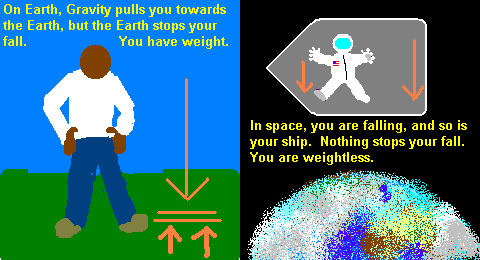Gravity and weight aren t the same things in space where gravity s absent astronauts have no weight once they return to earth where there s gravity astronauts have weight again

Gravity and Weight: Understanding the Difference

Gravity is a fundamental force that influences the behavior of objects in the universe. It is responsible for the attraction between two objects with mass. On the other hand, weight is the measurement of the force of gravity acting on an object. While these two concepts are closely related, they are not the same. Understanding the difference is crucial, especially when it comes to space exploration and the experiences of astronauts.
In space, where gravity’s absence is noticeable, astronauts experience a state of weightlessness. This absence of weight is often described as a sensation of floating freely in a zero-gravity environment. However, this does not mean that gravity does not exist in space; it simply means that the force of gravity experienced at that specific location is negligible compared to Earth’s gravity.

Weightlessness occurs when an object, such as a spacecraft, is in freefall. Freefall is the state in which an object falls under the sole influence of gravity, without any other forces acting upon it. Due to the spacecraft and the astronauts within it falling towards the Earth at the same rate, they experience a weightless environment. This phenomenon can be likened to the common experiment of dropping a feather and a hammer in a vacuum chamber on Earth; both fall at the same rate, defying our everyday expectation due to air resistance.
During their stay in space, astronauts adapted to this unique environment. Their bodies adjust to the absence of gravity by undergoing several physiological changes. For example, the lack of gravitational force affects how fluids distribute in their bodies, leading to a “puffy” appearance observed in some astronauts. Muscles and bones also experience reduced stress, as the need to support the body against gravity diminishes.
However, when astronauts return to Earth, where gravity is present, their weight returns as well. The sudden reacquaintance with this force can be felt as a heavy load on their bodies. The adjustment period after space travel can be physically demanding, requiring rehabilitation to recover muscle strength and coordination affected by the period of weightlessness.
In conclusion, gravity and weight are distinct concepts. Gravity is a universal force that attracts objects with mass, while weight measures the force of gravity on an object. In space, where gravity is significantly weaker, astronauts experience weightlessness. This experience of floating freely without any sensation of weight is a result of being in a state of freefall within a spacecraft. As astronauts return to Earth, they once again encounter the force of gravity, leading to the sensation of weight. Through understanding the difference between gravity and weight, we can gain further insight into the unique experiences of astronauts in space.
Source: European Space Agency
Related Posts
Quick Links
Legal Stuff

